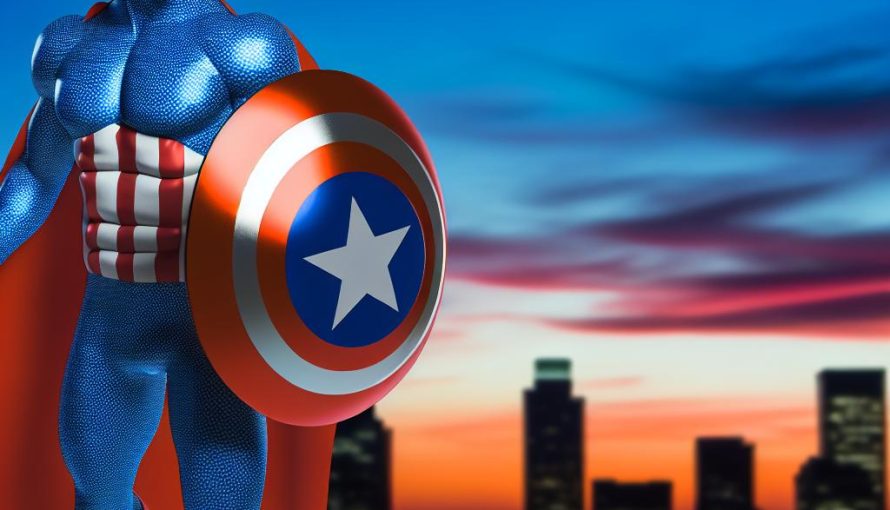Captain America

Introduction to Captain America
Captain America stands as a central figure in the realm of superhero literature. Emerging from the creative minds of writer Joe Simon and artist Jack Kirby, this fictional superhero debuted in “Captain America Comics” #1 in 1941. Published by Timely Comics, a forerunner of Marvel Comics, Captain America was introduced during a period when the world found itself engulfed in World War II, setting the stage for his characterization as a paragon of American values and a fighter against tyranny.
Character Background
Steve Rogers, the man behind the mask and shield of Captain America, presents a compelling narrative arc of transformation and empowerment. Hailing from Brooklyn, New York, Rogers’ initial portrayal as a frail and sickly youth made his evolution into a quintessential super-soldier both intriguing and inspiring. This metamorphosis was facilitated by the “Super-Soldier Serum,” an experimental formula developed during World War II, magnifying him to the zenith of human physical capabilities. As Captain America, Steve Rogers frequently assumes the mantle of leadership within the ranks of the Avengers, a testament to his tactical acumen and moral compass.
Comic Book History
The inception of Captain America during the early 1940s coincided with the global unrest of World War II. Conceived as a symbol of patriotic fervor, he was depicted frequently confronting the Axis powers, personifying the fight against oppression and injustice during the war.
Golden Age
The Golden Age of comics witnessed Captain America’s adventures enthralling audiences with tales of heroism against the backdrop of a war-torn world. His exploits against the Nazis and other antagonists were characterized by straightforward narratives brimming with action, serving as a resonant emblem of hope and resilience for readers during this tumultuous period.
Silver Age to the Present
The revival of Captain America in the Silver Age was marked by his reintroduction in “Avengers” #4 (1964), a turning point that revitalized the character for contemporary audiences. This era saw Captain America transitioning into stories that engaged with more complex themes. His own series began to unravel narratives that confronted modern threats, delving into social and moral dilemmas reflective of the evolving cultural landscape.
Film Appearances
The cinematic portrayal of Captain America has helped cement his place in popular culture, with various adaptations over the years. No adaptation has been more impactful than his inclusion in the Marvel Cinematic Universe (MCU), where Chris Evans brought the character to life. His debut in the MCU with “Captain America: The First Avenger” (2011) faithfully traced his origins and set the stage for a pivotal role in the ongoing narrative arcs of the franchise.
The Marvel Cinematic Universe
In the Universe, Captain America’s storylines are intricately woven with those of other iconic Marvel characters, creating an elaborate narrative tapestry. His journey through films such as Captain America: The Winter Soldier (2014), Avengers: Age of Ultron (2015), Captain America: Civil War (2016), Avengers: Infinity War (2018), and Avengers: Endgame (2019) depict an evolution that mirrors the complexities of contemporary society and superhero mythos. These films explore themes of friendship, loyalty, and the struggle between collective obligation and individual morality, expanding on the robust characterization established in the comics.
Key Themes and Symbolism
At the heart of Captain America’s character lies a set of enduring themes and symbols. He is often personified as a vessel of American principles and duty, serving as a bulwark against despotism and injustice. This representation is timelessly underscored by his moral clarity, a relentless adherence to ethical standards even in the face of adversity. His shield, emblematic of protection, constructed from the fictional metal vibranium, is both his weapon of choice and a powerful symbol of defense and resilience. It embodies the essence of what Captain America represents — a guardian and an indefatigable force for what is just.
Cultural Impact
Captain America has transcended the pages of comic books to become an icon of American culture. His influence permeates not only graphic literature and cinema but extends to television, video games, and beyond, permeating various media platforms. As a cultural symbol, Captain America has sparked debates on leadership and morality, resonating across generational lines and continually affirming his place in the pantheon of iconic fictional heroes.
Further Reading
For an expansive exploration of Captain America’s adventures and his cultural imprint, several resources offer a deeper dive. Marvel’s official website provides extensive information on the character’s appearances and story arcs across various media. Additionally, comic book archives serve as valuable portals, granting insights into the long-standing history and evolution of Captain America as an iconic figure in both the comic book industry and broader popular culture.